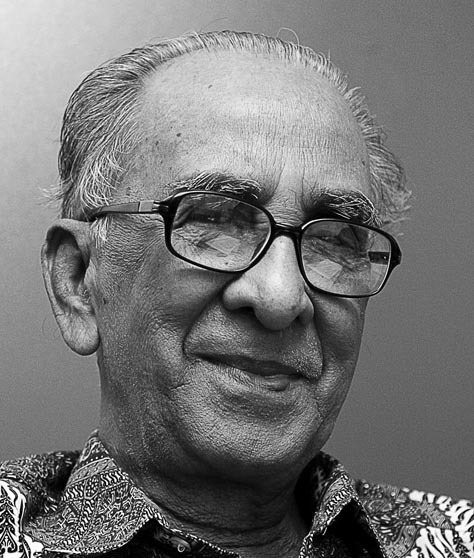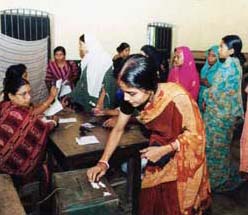|
List Of Chief Advisers Of Bangladesh
The Chief Adviser of Bangladesh (), officially Chief Adviser of the People's Republic of Bangladesh (), is the chief executive of the caretaker and the interim government of Bangladesh, who serves as the head of government during the transition period between one elected government and another. With powers roughly equivalent to those of the prime minister of an elected government, their executive power is limited by the constitution. The chief adviser leads an advisory committee comprising several advisers (equivalent to a minister), all of them selected from among politically neutral individuals to be acceptable to all major political parties. The office of the chief adviser is called Chief Adviser's Office. History The caretaker government system of Bangladesh was introduced in March 1996 through the passage of the 13th amendment to the constitution. The system was formed to hold parliamentary elections after the election in February conducted by the Khaleda Zia government ... [...More Info...] [...Related Items...] OR: [Wikipedia] [Google] [Baidu] |
Muhammad Yunus
Muhammad Yunus (born 28 June 1940) is a Bangladeshi economist, entrepreneur, and civil society leader who has been serving as the Chief Adviser of Bangladesh, Chief Adviser of the Interim government of Muhammad Yunus, interim Yunus ministry, government of Bangladesh since 8 August 2024. Yunus pioneered the modern concept of microcredit and microfinance, for which he was awarded the Nobel Peace Prize in 2006 as the first Bangladeshi. He is the founder of Grameen Bank. Born in Hathazari Upazila, Hathazari, Chittagong District, Chittagong, Yunus passed his matriculation and intermediate examinations from Chittagong Collegiate School and Chittagong College, respectively. He completed his BA from University of Dhaka and joined as a lecturer in Chittagong College. He obtained his PhD in economics from Vanderbilt University in the United States. After the Bangladesh famine of 1974, devastating famine of 1974, Yunus started to work on poverty elevation in Bangladesh. He began experim ... [...More Info...] [...Related Items...] OR: [Wikipedia] [Google] [Baidu] |
Next Bangladeshi General Election
General elections are expected to take place in Bangladesh in the first half of April 2026 following the removal of the government of Sheikh Hasina amidst the July Revolution (Bangladesh), July Revolution in August 2024. The Yunus ministry, interim government led by Muhammad Yunus has established Constitutional Reform Commission (Bangladesh), constitutional and Yunus ministry#Reform commissions, election reform commissions for this purpose. Background The Awami League won the 2024 Bangladeshi general election, 2024 general elections following a record low voter turnout and a controversial election, spite of which they formed Fifth Hasina ministry, a government. The United States Department of State stated that the election was not free and fair and the United Kingdom's Foreign, Commonwealth and Development Office termed the election lacking the preconditions of democracy. According to ''The Economist'', through this election, "Bangladesh effectively became a one-party state". ... [...More Info...] [...Related Items...] OR: [Wikipedia] [Google] [Baidu] |
Khaleda Zia
Begum Khaleda Zia (born August–September 1945) is a Bangladeshi politician who served as the prime minister of Bangladesh from 1991 to 1996 and again from 2001 to 2006. She was the first female prime minister of Bangladesh and the second female prime minister in the Muslim world, after Benazir Bhutto. She is the widow of former president of Bangladesh, president of Bangladesh and army commander, Ziaur Rahman. She has been the chairperson and leader of the Bangladesh Nationalist Party (BNP) since 1984, which was founded by her husband, Zia, in 1978. Khaleda came to national attention as the First Lady of Bangladesh after her husband, Rahman, became the president in 1977. After Assassination of Ziaur Rahman, Rahman's assassination in 1981, Khaleda joined politics and came to lead BNP. After 1982 Bangladesh coup d'état, a military coup in 1982, she helped lead the movement for democracy. She became the prime minister following the victory of BNP in 1991 Bangladeshi general elect ... [...More Info...] [...Related Items...] OR: [Wikipedia] [Google] [Baidu] |
February 1996 Bangladeshi General Election
General elections were held in Bangladesh on 15 February 1996. They were boycotted by most opposition parties, and saw voter turnout drop to just 15%.Dieter Nohlen, Florian Grotz & Christof Hartmann (2001) ''Elections in Asia: A data handbook, Volume I'', p525 The result was a victory for the Bangladesh Nationalist Party (BNP), which won 278 of the 300 directly elected seats. This administration was short-lived, however, only lasting 12 days before the installation of caretaker government and fresh elections held in June. The elections were characterized by violence, as well as boycotts by major opposition parties. Background In March 1994 controversy over a parliamentary by-election, which the Bangladesh Awami League-led opposition claimed the BNP government had rigged, led to an indefinite boycott of Parliament by the entire opposition. The opposition also began a program of repeated general strikes to press its demand that Khaleda Zia's government resign and that a caretak ... [...More Info...] [...Related Items...] OR: [Wikipedia] [Google] [Baidu] |
Chief Adviser's Office
The Chief Adviser's Office (CAO) () is the official workplace of the Chief Adviser of Bangladesh during an interim or caretaker government. Its the office of the Head of Government of Bangladesh during an interim or caretaker government. Its equivalent to the Prime Minister's Office during an elected government. It represents the executive branch of the Government of the People's Republic of Bangladesh during an interim or caretaker government. The location of the CAO is in Tejgaon, Dhaka. Headquarters Following the resignation of Prime Minister Sheikh Hasina, an Interim Government led by Muhammad Yunus Muhammad Yunus (born 28 June 1940) is a Bangladeshi economist, entrepreneur, and civil society leader who has been serving as the Chief Adviser of Bangladesh, Chief Adviser of the Interim government of Muhammad Yunus, interim Yunus ministry, g ... was formed on 8 August 2024. During the initial days of the interim government, State Guest House Jamuna acted as the Chief ... [...More Info...] [...Related Items...] OR: [Wikipedia] [Google] [Baidu] |
Adviser (Bangladesh)
Adviser (), also spelt Advisor, refers to a government official who oversees one or more government ministries in the interim and caretaker government systems of Bangladesh. An adviser has the status equivalet to the Minister of an elected government. During an interim government, several advisers and the Chief Adviser forms the cabinet instead of Prime Minister and ministers. Usually people who serves as adviser in an interim government in Bangladesh are politically nonpartisan. See also *Chief Adviser (Bangladesh) *Cabinet of Bangladesh *Interim government system of Bangladesh The interim government system of Bangladesh was established following the 1990 mass uprising resulting in the overthrow of President Hussain Muhammad Ershad, the interim government was led by Shahabuddin Ahmed. It was revived again following ... * Caretaker government of Bangladesh Notes References {{Bangladesh-stub Government advisers of Bangladesh Political office-holders in Banglad ... [...More Info...] [...Related Items...] OR: [Wikipedia] [Google] [Baidu] |
Elections In Bangladesh
Bangladesh elects on national level a legislature with one house or chamber. The unicameral Jatiyo Sangshad, meaning national parliament, has 350 members of which 300 members are directly elected through a national election for a five-year term in single-seat constituencies while 50 memberships are reserved for the women who are selected by the ruling party or coalition. The Prime Minister is the head of the government. The president who is the head of the state is elected by the National Parliament. The president of Bangladesh is a ceremonial post and does not exercise any control over the running of the state. Prior to the 2024 Bangladesh constitutional crisis, the country had a two-party system that had evolved over time since the election of 1991. Two political parties or coalitions dominated, one headed by Bangladesh Awami League and the other by Bangladesh Nationalist Party, making it difficult for anybody to achieve electoral success under the banner of any other party. ... [...More Info...] [...Related Items...] OR: [Wikipedia] [Google] [Baidu] |
Head Of Government
In the Executive (government), executive branch, the head of government is the highest or the second-highest official of a sovereign state, a federated state, or a self-governing colony, autonomous region, or other government who often presides over a cabinet (government), cabinet, a group of ministers or secretaries who lead executive departments. In diplomacy, "head of government" is differentiated from "head of state". The authority of a head of government, such as a president, chancellor, or prime minister, and the relationship between that position and other state institutions, such as the relation between the head of state and of the legislature, varies greatly among sovereign states, depending largely on the particular system of the government that has been chosen, won, or evolved over time. In most parliamentary systems, including constitutional monarchies, the head of government is the ''de facto'' political leader of the government, and is answerable to at least ... [...More Info...] [...Related Items...] OR: [Wikipedia] [Google] [Baidu] |
Bangladesh
Bangladesh, officially the People's Republic of Bangladesh, is a country in South Asia. It is the List of countries and dependencies by population, eighth-most populous country in the world and among the List of countries and dependencies by population density, most densely populated with a population of over 171 million within an area of . Bangladesh shares land borders with India to the north, west, and east, and Myanmar to the southeast. It has a coastline along the Bay of Bengal to its south and is separated from Bhutan and Nepal by the Siliguri Corridor, and from China by the List of Indian states, Indian state of Sikkim to its north. Dhaka, the capital and list of cities and towns in Bangladesh, largest city, is the nation's political, financial, and cultural centre. Chittagong is the second-largest city and the busiest port of the country. The territory of modern Bangladesh was a stronghold of many List of Buddhist kingdoms and empires, Buddhist and List of Hindu empir ... [...More Info...] [...Related Items...] OR: [Wikipedia] [Google] [Baidu] |
Interim Government System Of Bangladesh
The interim government system of Bangladesh was established following the 1990 mass uprising resulting in the overthrow of President Hussain Muhammad Ershad, the interim government was led by Shahabuddin Ahmed. It was revived again following the Student–People's uprising resulting in Prime Minister Sheikh Hasina's ousting and fleeing from the country to India, which is being led by the Nobel laureate Muhammad Yunus. Background This first interim government system was formed on 9 December 1990, following the resignation of HM Ershad. The second interim government was constituted on 5 August 5 2024 by the president of Bangladesh in consultation with several coordinators of the Anti-discrimination Students Movement and the Chief of Army Staff. Subsequently, on August 8, an interim government was formed with Muhammad Yunus Muhammad Yunus (born 28 June 1940) is a Bangladeshi economist, entrepreneur, and civil society leader who has been serving as the Chief Adviser ... [...More Info...] [...Related Items...] OR: [Wikipedia] [Google] [Baidu] |
Chief Executive
A chief executive officer (CEO), also known as a chief executive or managing director, is the top-ranking corporate officer charged with the management of an organization, usually a company or a nonprofit organization. CEOs find roles in various organizations, including public and private corporations, nonprofit organizations, and even some government organizations (notably state-owned enterprises). The governor and CEO of a corporation or company typically reports to the board of directors and is charged with maximizing the value of the business, which may include maximizing the profitability, market share, revenue, or another financial metric. In the nonprofit and government sector, CEOs typically aim at achieving outcomes related to the organization's mission, usually provided by legislation. CEOs are also frequently assigned the role of the main manager of the organization and the highest-ranking officer in the C-suite. Origins The term "chief executive officer" is attes ... [...More Info...] [...Related Items...] OR: [Wikipedia] [Google] [Baidu] |





